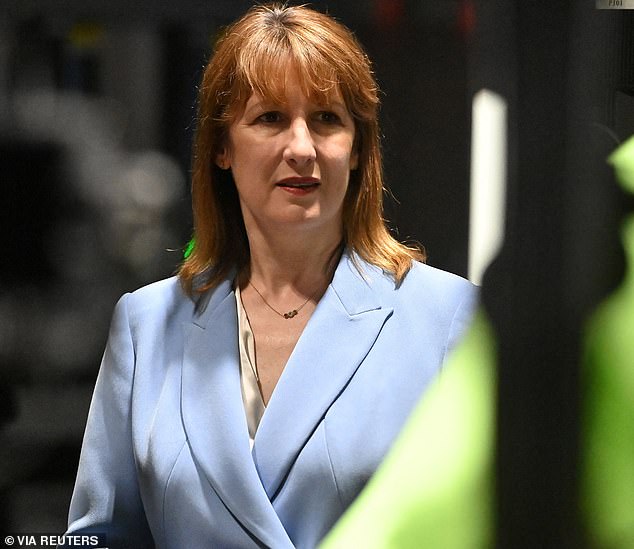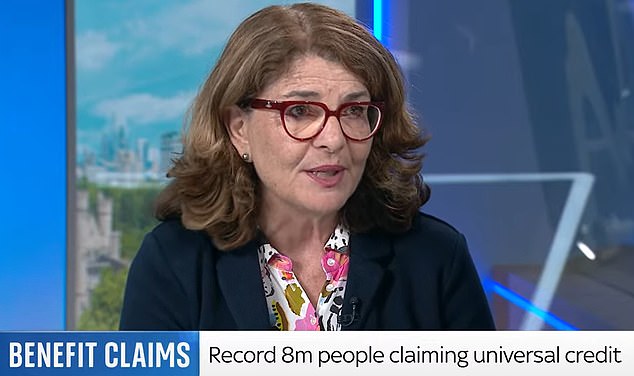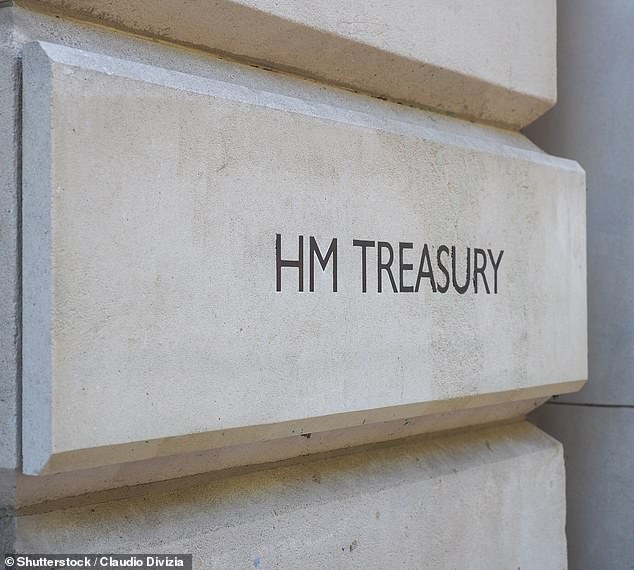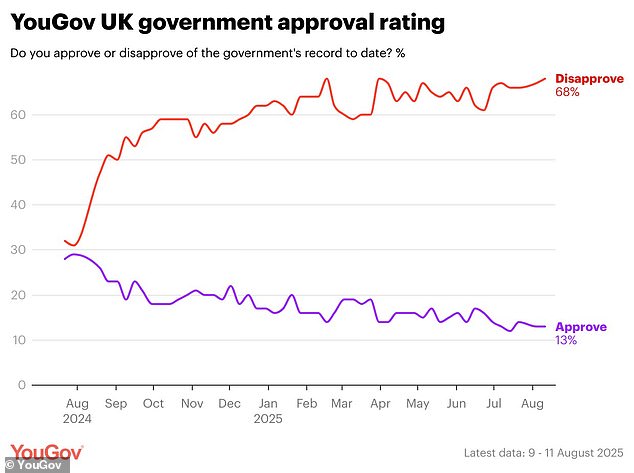A Labour minister today opened the door to a controversial inheritance tax raid as Chancellor Rachel Reeves looks to plug a £50billion spending hole at her next Budget.
Dame Diana Johnson, the policing minister, failed to rule out changes to the so-called ‘death tax’ this autumn amid growing concerns about the state of the public finances.
It follows claims that Treasury officials are examining whether tightening rules around the gifting of assets and money could help fill the multi-billion pound shortfall.
Under consideration is the prospect of a lifetime cap which would limit the amount a person could gift before their death, the Guardian reported.
The Tories warned that the plans revealed Labour’s ‘politics of envy’ and said people should not be punished for passing on their hard-earned money.
The National Institute of Economic and Social Research recently judged that Ms Reeves needs to find £50billion in tax rises or spending cuts to balance the books by the end of the decade.
The respected think tank said higher-than-expected public sector borrowing and weaker economic growth had left the Chancellor with an ‘impossible’ choice between the two options.
As well as a possible inheritance tax raid, Ms Reeves is also said to be looking at a fresh increase in the capital gains tax rate, as well as further ‘stealth’ and ‘sin’ taxes.

A Labour minister has opened the door to an inheritance tax raid as Chancellor Rachel Reeves looks to plug a £50billion spending hole at her next Budget

Dame Diana Johnson, the policing minister, failed to rule out changes to the so-called ‘death tax’ this autumn amid growing concerns about the state of the public finances

It follows claims that Treasury officials are examining whether tightening rules around the gifting of assets and money could help fill the multi-billion pound shortfall
Asked by Sky News this morning if Ms Reeves is planning an inheritance tax raid, Dame Diana said: ‘I’m not the Chancellor and she’s obviously going to announce her Budget in the autumn and we’ll make her announcements then.
‘But what I’m really clear about is that the decisions that she’s already taken have allowed, for example, for me as the policing minister to make sure that we’re getting those 3,000 additional police officers this year into our communities to keep people safe.
‘So I think the Budget will come in October and we’ll hear then what she wants to announce.’
Responding to Dame Diana’s comments, Tory MP Sir Mel Stride, the shadow chancellor, warned against ‘punishing’ savers for Labour’s fiscal black hole.
‘The mask has slipped,’ he said. ‘Labour is coming for your family’s future to fund their failure – and they won’t stop at inheritance tax.
‘Those who’ve worked hard, saved responsibly and hope to leave something behind shouldn’t be punished to pay for Labour’s economic black hole.
‘It’s the same old Labour: tax first, think later. Nothing is safe under Labour – not your savings, not your pension, not even the gift of helping your children.
‘This is the politics of envy and working families will pay the price.’
Helen Whately, the shadow work and pensions secretary, told GB News there would ‘inevitably’ be tax rises in the autumn following Labour’s failure to ‘get a grip’ on welfare spending.
New figures, published by the Department for Work and Pensions yesterday, showed the number of people claiming Universal Credit hit 8 million last month.
The steep rise in the number of claimants over the past 12 months was driven almost entirely by people who are not required to work.
The number of people on Universal Credit with ‘no work requirements’ reached 3.7 million in July this year – an increase of 39 per cent or 1 million since July 2024.
It means 46 per cent of all Universal Credit claimants are not expected to do anything to prepare or to look for work.
Sir Keir Starmer last month saw his attempt to cut Britain’s ballooning benefits bill derailed by a major rebellion among Labour MPs.
The Prime Minister was forced to scrap most of his planned welfare changes in the face of a huge Labour revolt.
An earlier U-turn on axing winter fuel payments for millions of pensioners has also left Ms Reeves with billions of pounds to try and find in spending cuts or tax rises in her next Budget.
John O’Connell of the TaxPayers’ Alliance, said: ‘As if hammering family farms and clobbering small businesses wasn’t enough, Reeves now wants to launch a smash and grab on presents to children and grandchildren.
‘This is nothing more than a shameless cash grab to paper over the cracks of a Government that can’t control its own spending.
‘Punishing parents and grandparents for treating their loved ones is little more than the politics of envy.
‘Not only should this vindictive policy be ruled out immediately, but inheritance tax itself should be scrapped in its entirety.’
A new analysis by Pantheon Macroeconomics predicted Ms Reeves will hit households with ‘a mix of ‘sin’ tax and duty hikes, the freezing of income-tax thresholds, and either pension-tax or unspecified spending restrictions in 2029-30 to fill the hole in the public finances’.
A sin tax is a tax on goods and services which are deemed harmful to individuals or society, such as tobacco or alcohol, as well as gambling.
Freezing income-tax thresholds is often referred to as a ‘stealth tax’ because more people are pulled into paying higher rates of tax as their wages grow.
The Pantheon report added: ‘Public finances are in a desperate condition, and the Government appears to be limping from one fiscal event to another with no clear plan to deal with medium-term fiscal pressures and long-term sustainability.’
Adam Corlett, principal economist at the Resolution Foundation, told The i Paper: ‘With the Chancellor likely to need significant tax revenues in her Budget this autumn, sin taxes are a sensible place to start.
‘Specific policies could include raising gambling duties and aviation levies, while motoring taxes are also in need of reform.
‘But while sensible, there are limits to how much these reforms can raise, and the Chancellor may need to look to more mainstream taxes if the fiscal hole she needs to fill is particularly large.’

The YouGov polling data shows Labour’s approval rating is getting worse and worse
Ms Reeves has already ruled out increasing National Insurance, income tax and VAT for workers leaving her limited options to raise money unless she changes her fiscal rules.
Inheritance tax raises around £7billion a year and is paid by around four per cent of estates.
It is currently set at a rate of 40per cent of the value of estates above £325,000.
Labour officials are said to be concerned about the amount of money being extracted from pension pots and gifted to relatives.
They are reportedly looking for a way to tap into the wealth of the ‘boomer’ generation who have benefited from rising property prices and gold-plated pensions.
Gifts made seven years before someone dies are at present not subject to inheritance tax.
Those given three to seven years before death are taxed on a sliding scale known as ‘taper relief’. The rate reduces each year from 32per cent to 8per cent.
A Treasury source told the Guardian: ‘With so much wealth stored in assets like houses that have shot up in value, we have to find ways to better tap into the inheritances of those who can afford to contribute more.
‘It’s hard to make sure these taxes don’t end up with loopholes that undermine their purpose.
‘But we are trying to work out what revenue might be raised and how to ensure it’s a fair approach.’

Tory MP Sir Mel Stride, the shadow chancellor, warned Ms Reeves against ‘punishing’ savers for Labour’s fiscal black hole
The source added: ‘IHT can raise more, and even if we do nothing, it will raise more money as the threshold for paying it stays frozen.
‘But we have to look at the levers for taxing wealth if the aim of the government is to avoid hitting earnings from work as much as possible.’
At the last Budget, Ms Reeves changed the rules so farmers paid inheritance tax for the first time on estates over £1million.
The paper also reported that Ms Reeves is looking at whether to increase capital gains tax rates by a few percentage points.
This could be teamed with an allowance for those who put money into British businesses so as not to deter investment into the UK.
Ms Reeves has been under pressure from her backbenchers to introduce a form of wealth tax to target the rich.
A Treasury spokesman said: ‘As set out in the plan for change, the best way to strengthen public finances is by growing the economy – which is our focus.
‘Changes to tax and spend policy are not the only ways of doing this, as seen with our planning reforms, which are expected to grow the economy by £6.8bn and cut borrowing by £3.4bn.
‘We are committed to keeping taxes for working people as low as possible, which is why at last autumn’s budget we protected working people’s payslips and kept our promise not to raise the basic, higher or additional rates of income tax, employee national insurance or VAT.’
The possible changes to inheritance tax come after Sir Keir’s popularity today sunk to its lowest level to date.
The Government’s approval rating slipped to minus 55, according to pollsters YouGov.
Just 13 per cent of the public included in the survey said they approved of the Government’s record since returning to power under Sir Keir last summer – the same percentage as the previous week.
But those who disapproved slipped by another percentage point, down to 68 per cent.
It meant the net approval rating lurched to a record low for this administration.
The weekly poll makes grim reading for Labour HQ, and follows a series of blows to Sir Keir’s authority, including fresh accusations he has failed to get a hold of the small boats crisis, and claims he has presided over a ‘two-tier’ justice system.
He also had to deal with the resignation of his homelessness minister over a rental home row.
The YouGov data came after it was officially confirmed more than 50,000 migrants have arrived in the UK after crossing the English Channel since Labour won the 2024 general election.
Analysis claimed the milestone was reached in 401 days of the Starmer government, compared with 603 days for Rishi Sunak’s administration, and more than 1,000 days under Boris Johnson’s.
Liz Truss did not last long enough to reach the landmark, although a total of 10,532 migrants arrived in the UK after crossing the Channel during the 49 days of her premiership.












